
Vietnam J. Agri. Sci. 2025, Vol. 23, No. 2: 174-182 Tạp chí Khoa học Nông nghiệp Việt Nam 2025, 23(2): 174-182
www.vnua.edu.vn
174
Trần Thị Yên1,2, Huỳnh Phước Vinh1, Trần Trung Giang1, Vũ Ngọc Út1*
1Trường Đại học Cần Thơ
2Trường Đại học Quảng Bình
*Tác giả liên hệ: vnut@ctu.edu.vn
Ngày nhận bài: 21.10.2024 Ngày chấp nhận đăng: 19.02.2025
TÓM TẮT
Nghiên cứu được thực hiện nhằm xác định loại tảo và mật độ tảo thích hợp cho ương ấu trùng giun nhiều tơ
Dendronereis chipolini ở giai đoạn trôi nổi. Ấu trùng giun nhiều tơ sau khi nở được bố trí cho ăn 3 loài tảo tương ứng
với 3 nghiệm thức bao gồm (i) Chaetoceros sp., (ii) Chlorella sp. và (iii) Nannocholoropsis oculata với 5 lần lặp lại.
Sau 6 ngày thí nghiệm, chỉ số biến thái ở 3 nghiệm thức giống nhau và đều bằng 3. Tuy nhiên, chiều dài
(0,245 ± 0,001mm) và tỷ lệ sống của ấu trùng (37,6 ± 1,48%) cao nhất được ghi nhận ở nghiệm thức cho ăn
Chlorella sp., khác biệt có ý nghĩa thống kê (P <0,05). Tảo Chlorella sp. được sử dụng để bố trí thí nghiệm tiếp theo
nhằm xác định mật độ cho ăn thích hợp nhất. Thí nghiệm được bố trí với 4 nghiệm thức gồm 500 tb/ml, 1.000 tb/ml,
1.500 tb/ml và 2.000 tb/ml với 5 lần lặp lại. Kết quả cho thấy ở mật độ 500 tb/ml, ấu trùng có chiều dài
(0,247 ± 0,008mm) và tỷ lệ sống (44,4 ± 2,97%) cao nhất và khác biệt có ý nghĩa thống kê (P <0,05). Như vậy, tăng
trưởng và tỷ lệ sống của ấu trùng giun nhiều tơ Dendronereis chipolini giai đoạn sống nổi tốt nhất khi được cho ăn
tảo Chlorella sp. với mật độ 500 tb/ml.
Từ khóa: Dendronereis chipolini, giai đoạn sống nổi, giun nhiều tơ, mật độ tảo, tảo Chlorella sp.
Determination of Suitable Algal Species and Density for Growth
of Polychaete (Dendronereis chipolini) Larvae at the Planktonic Stage
ABSTRACT
The study was conducted to determine the appropriate species and density of alga for the larvae of the
polychaete Dendronereis chipolini at the planktonic stage. After hatching, the larvae were fed with 3 different algal
species corresponding to 3 treatments including (i) Chaetoceros sp., (ii) Chlorella sp. and (iii) Nannocholoropsis
oculata. After 6 days of experiment, the metamorphosis index in the 3 treatments was similar and equal to 3.
However, highest growth in length (0.245 ± 0.001mm) and survival rate (37.6 ± 1.48%) of the larvae were obtained in
the Chlorella sp. treatment which was statistically significant (P <0.05). Chlorella sp. was used in the successive
experiments to determine the most suitable density for the polychaete larvae. The experiment was designed with 4
treatments including 500 cells/ml, 1,000 cells/ml, 1,500 cells/ml and 2,000 cells/ml with 5 replicates. Highest length
(0.247 ± 0.008mm) and survival rate (44.4 ± 2.97%) of the larvae were recorded in treatment of 500 cells/ml which
was also significantly different (P <0.05). The results showed that the best growth and survival rate of the polychaete
Dendronereis chipolini larvae at the planktonic stage can be obtained when they are fed with Chlorella sp. at a
density of 500 cells/ml.
Keywords: Alga density, Chlorella sp., Dendronereis chipolini, planktonic stage, polychaetes.

Trần Thị Yên, Huỳnh Phước Vinh, Trần Trung Giang, Vũ Ngọc Út
175
‰ ‰
± µ ± µ
± µ

Xác định loại và mật độ tảo phù hợp cho sự phát triển của ấu trùng giun nhiều tơ (Dendronereis chipolini) giai đoạn
sống nổi
176
(A) (B)
Chỉ tiêu theo dõi Phương pháp thu mẫu Phương pháp phân tích
Nhiệt độ (C) Đo trực tiếp Máy đo đa chỉ tiêu HANNA (HI9828)
pH Đo trực tiếp Máy đo đa chỉ tiêu HANNA (HI9828)
TAN (Tổng đạm ammonia) (mg/l) Thu mẫu nước và trữ lạnh 4C Phenate, 4500-B (APHA, 2017)
NO2- (mg/l) Thu mẫu nước và trữ lạnh 4C Diazonium, 4500-B (APHA, 2017)
±
±

Trần Thị Yên, Huỳnh Phước Vinh, Trần Trung Giang, Vũ Ngọc Út
177
× × ×
×
°
°
°
±
±

Xác định loại và mật độ tảo phù hợp cho sự phát triển của ấu trùng giun nhiều tơ (Dendronereis chipolini) giai đoạn
sống nổi
178
±
Chỉ tiêu NT1 (Chaetoceros sp.) NT2 (Chlorella sp.) NT3 (Nannochloropsis oculata)
Nhiệt độ (C) 30,20 ± 1,02 30,20 ± 1,01 30,20 ± 1,01
pH 8,32 ± 0,21 8,27 ± 0,16 8,20 ± 0,16
TAN (mg/l) 0,29 ± 0,11 0,23 ± 0,11 0,29 ± 0,12
NO2- (mg/l) 0,81 ± 0,05 0,77 ± 0,04 0,84 ± 0,06
±
Ngày NT1 (Chaetoceros sp.) NT2 (Chlorella sp.) NT3 (Nannochloropsis oculata)
0 0,124a ± 0,003 0,124a ± 0,003 0,124a ± 0,003
2 0,168a ± 0,004 0,173b ± 0,056 0,171b ± 0,005
4 0,202a ± 0,014 0,207b ± 0,009 0,205ab ± 0,008
6 0,240a ± 0,010 0,245b ± 0,010 0,243ab ± 0,008
±
Ngày NT1 (Chaetoceros sp.) NT2 (Chlorella sp.) NT3 (Nannochloropsis oculata)
0 1,00 ± 0,00 1,00 ± 0,00 1,00 ± 0,00
2 2,16a ± 0,05 2,34b ± 0,05 2,24a ± 0,09
4 3,00 ± 0,00 3,00 ± 0,00 3,00 ± 0,00
6 3,00 ± 0,00 3,00 ± 0,00 3,00 ± 0,00
±

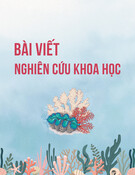
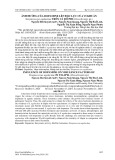
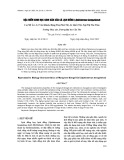

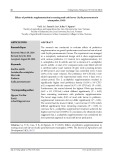
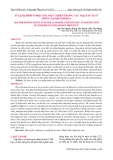
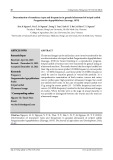
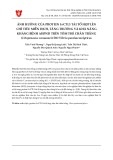
![Giáo trình Sinh lý động vật thủy sinh (Nghề: Bệnh học thuỷ sản) - Trường Cao đẳng Cộng đồng Đồng Tháp [Trung cấp]](https://cdn.tailieu.vn/images/document/thumbnail/2022/20221012/troinangxanh10/135x160/1671665565981.jpg)
















